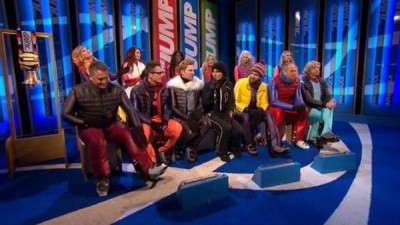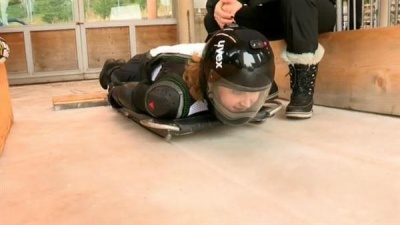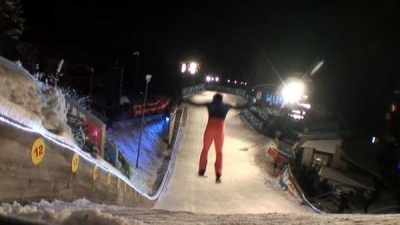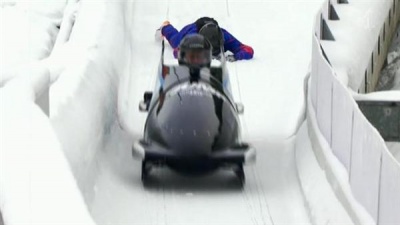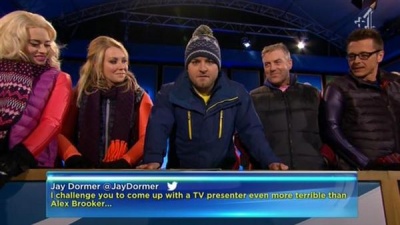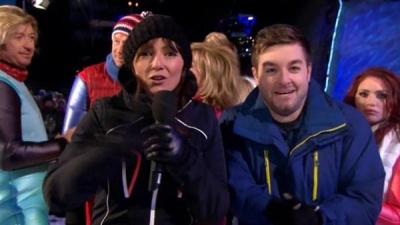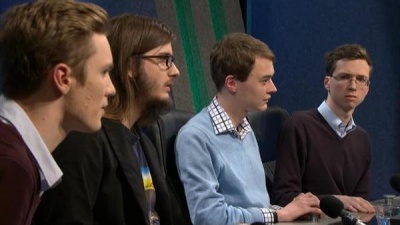Weaver's Week 2014-02-16
Last Week | Weaver's Week Index | Next Week
Did you remember to get an EHIC?
Contents[hide] |
The Jump
TwoFour and Group M for Channel 4, 26 January – 3 February
The European Health Insurance Card is very helpful to demonstrate one is entitled to receive medical treatment. It can be useful if one is eating grennoules with M. Boyard. It can be invaluable if one is drinking with tourists on the Costa Spewa. And it can be handy if one is a television producer in Austria.
The list of participants on The Jump had so many footnotes we thought it was an entry in The 100 Most Pointless Arguments Solved (half-price in a bookshop near you). The following were not eliminated by the titular jump.
* Tara Palmer-Tompkinson (I'm a Celebrity contestant) withdrew during training, replaced by Laura Hamilton (Fort Boyard host).
** Sam J Jones (Ming the Merciless) pulled out after sustaining a shoulder injury, replaced by Ritchie Neville (20% of Five the Tuneless).
*** Amy Childs (The Only Way is Essex person) reached the top of the ski jump, but refused to descend by any method other than the stairs.
**** Henry Conway (no, us neither) broke a bone during practice, and was replaced by Joe McElderry (off of The X Factor) after winning a jump-in.
***** Melinda Messenger (Fort Boyard host) incurred a concussion during training, and was replaced by jump-in loser and final standby contestant Donal McIntyre (journalist); he turned up in bubble wrap.
****** Steve Redgrave (rower) fell on the ski slopes, carried on for a few days, but was withdrawn on medical advice. By this time, there were no replacement contestants left.
******* Marcus Brigstocke (The Late Edition host) fell in the final ski competition, and was unable to finish the race.
Suggestions that the show could be called The Sick List or Last Person Standing were about right.
The structure of the programme was familiar from just about every celebrity talent show: a short video montage from training, before footage of the one measured performance. Some information about the time was given, but the final result was only shown when Davina was talking to the competitor. That's an excellent way to get a reaction shot without coming across as forced.
The chatter and advert breaks helped to keep things interesting. Never seeing more than eight performances on one night ensured that the end was always in sight. We never feel like it was a conveyor belt of celebs, in the way Strictly Come Dancing appears. On the other hand, the constant chopping between live reaction and sharply recorded sporting events and loosely recorded training footage was a little jarring.
The events took place in Austria, where there is snow and winter. We assume that this has been in the planning for a year or more, and might have been inspired by how Britain last year looked like Narnia. This year, of course, it's turned into Atlantis, and the BBC had first dibs on that setting. So it's refreshing to see something different on screen, something we're not seeing outside our window.
The Jump was commissioned to drum up interest in Channel 4 and its coverage of the Paralympics, a sporting event to be held in Russia next month. It follows another event currently taking place in the same area, but this column's interest in that commercial festival of jingoism is limited to individual competitors such as Semen Pavlichenko and Andreas Wank, and how much Bradley will corpse when they turn up on The Chase.
Being a winter sports programme, it was always going to test various winter sports. Sliding down an ice slope on a tea-tray, and on something more substantial. Coming down a mountain at an angle, and in a straight line. Going round and round an ice track. Coming down a mountain while two people are weaving, and coming down a mountain where little beasties left snow molehills. And, of course, the whole coming down a mountain and flying through the air thing.
That's a lot of events requiring body strength and flexibility, and nothing that needs particularly much training. We didn't get to see celebrities taking part in the biathlon, a combination of cross-country skiing and rifle shooting. The professionals use real bullets, the celebrities can use lasers so they avoid shooting themselves in the foot. There was no ice dance, which was a relief because that's on ITV, and it's not a real sport anyway. We didn't get curling, throwing stones down an ice track to a target. We didn't get Curling (Rob), commentary was from Davies (Barry), warming himself up for the year's major sporting events. Ski-jumping expertise was from Edwards (Eddie), using all the knowledge he gleaned when he became the 2013 champion of Splash!. Bell (Graham) provided technical expertise, and also named the prize – a giant cowbell.
The net result was that all the events were about brute speed, there was no artistic impression. The fastest down the track was safe, the slowest was going to the jump-off. This was interesting to begin with, but the lack of variety began to get a bit wearing as the show continued. To reduce the strain on the competitors, the gentlemen competed on days 1 and 3, the ladies on days 2 and 4. Viewers might have been attracted by Darren Gough (cricketer) or Anthea Turner (chocolate publicist), but they couldn't both compete until day 5.
Brute force was also the hallmark for the final jump. Style was unimportant, the only thing that counted was distance from the zero point. Three jumps were available: a small one 15m from the landing point, a larger one of 24m, and a giant one giving jumps of 40m that seemed only to be used by Graham Bell. To ensure equitable performance and for safety, these were dry jumps, contestants were guided down on rails. The shortest distance recorded in the one attempt would eliminate someone. In theory, players were able to choose whichever jump they wished, but Ritchie blew the lid on the first night when he said "I've only been signed off for the small jump".
Ski-jumping was presented as a test of distance, but it appears there was a style element as well. This was driven home on the Friday programme, when Kimberley Walsh (singer) was eliminated after making a "foul jump". From watching Europa Sports, we know how people must land approximately upright; leaning too much is unsafe and not allowed. This wasn't made at all clear by The Jump, either on the night or on the Sunday edition.
As far as it went, The Jump was decently entertaining. It wasn't the best programme we've seen this year, but it held our attention throughout. What we never quite understood was why the titular jump was treated as the Surely Impossible Way of the Warrior, a challenge so difficult that only the worst can attempt it, and they are doomed to fail. A format awarding points, perhaps challenging the worst performer on the day to jump off against the worst performer so far this week, would have felt more equitable. Nor were we happy with the one-and-done format for most events: we could happily have seen two runs at the slalom, two tries at the bobsleigh. We do understand that the producers might have struggled for time, and met with a heftier insurance bill.
Alex Brooker was credited as co-host, he seemed to do very little except drink schnapps with each night's winner and read out some viewer correspondence. Davina McCall hosted in her usual excited manner. We've said on many occasions that Davina can make a marginal programme more enjoyable by sheer force of personality, and The Jump represented exactly what we mean: we'd have turned off if it wasn't for the host.
Which brings us to a Second Bite moment, our occasional series for corrections and clarifications. The UKGameshows statistics department has been checking records, checking them twice, and has worked out that we've over-reported Chris Tarrant's hosting duties. We now reckon he's presented fewer series than Bob Monkhouse managed. With The Jump, Davina has hosted 16 series, and we think she's now the most prolific host in British television game show history. (Or she might not be. Many years later, our researchers unearthed another Bob Monkhouse show, and that took his total to 16 as well. By the time we'd rootled this out, Davina had moved on to host even more shows.)
A shame that this auspicious occasion ended in such an anti-climax. With Marcus Brigstocke and Steve Redgrave unable to take to the jumping slope, it fell to substitute competitors Joe McElderry and Donal McIntyre to contest the two-person final. With such little happening, the final was shortened from an hour-and-a-half to just over an hour. McElderry repeated his jump-in victory of the previous week, and took this title. Not only is he the reigning champion of The Jump, he's also the current champion of Popstar to Operastar, a title he's held since summer 2012.
We're really not sure if we'd like to see another series of The Jump; we don't regret seeing what we've seen.
Countdown Update
After the remarkable standard of competitors last year, this year's Countdowners have been closer to the average viewer; we're yet to see anyone win the maximum eight heats, though a couple of competitors have impressed.
Rod Chatfield was the carry-over champion, but he lost his first match to close with 5 wins. Bobby Banerjee inflicted that defeat, and recorded a century score in his sixth game, only to lose the next to Ciaran Crawley. Three wins for that competitor, before he lost to Jamie Halliwell. Mr. Halliwell combines two of the longest-running television game shows, as he's pursuing a Masters in Eurovision Song Contest Studies, and won two games on Countdown.
Priscilla Munday brought his run to a close, the first of her six wins, including the second century of the year so far. She was defeated by Andy Gardner in a spectacular match; Andy went on to win six matches, and he could be a tricky opponent in the summer finals week. But the octochamp effort was thwarted by Martin Hamill (one win), he lost to Graeme Cheek (three wins). Andrew Farr won one game, losing to Adrian Day with what was only the third century of the year; he promptly lost to Brett Davids on Friday.
University Challenge
Group Phase 3, Match G: Trinity Cambridge v SOAS
Over at Only Connect, the potentially-confusing double-elimination quarter-final phase is handled with the show's hallmark velvet suavity: the teams play once, then the losers play again in phase two, then the winners in phase three, and the last two are found in phase four. Victoria explains this once, and then assumes we're smart enough to know what we're doing. In the unique way Granada makes this phase far harder than it needs to be, we chop and change through phases three and two, and the host never misses an opportunity to insult the producers by asserting this is far too complex for him.
Trinity are the only Cambridge side to make phase three, having done the decent thing and punched out Manchester's lights in the last match. SOAS made short work of Cardiff in their last outing, and begin this one with a penalty for a missignal. Trinity pick up the bonuses, on Russian visitors to London. We had a total trip-out with some of the answers: Trotsky! Lenin! Gagarin! Heroes of the Manchester '75 side? No, just right and wrong responses. Honours are just about even through the opening exchanges, and by the first visual round Trinity has a narrow lead of 50-40.
Aaronivitch might wonder how Trinity Cambridge know about "social mobility", but they do, and it yields 20 points to them and not to the opposition. SOAS do pick up on a starter about "24 hours", but their knowledge of feminist thinking extends only to Germaine Greer, the Big Brother flounce-out. (And that, good feminists in the public eye, is why one should think very carefully before doing Big Brother: it will define your career for many years afterwards. Just ask Jack Dee.)
Back at the game, Trinity had a 95-55 lead after the audio round, SOAS pulled back after being asked to spell some anagrams from definitions – it's not enough to know it's "coral" and "carol", one has to spell them now. That pulls them within 15 points, only for Trinity's Ralph Morley to get "Commonwealth realm" from a few examples; they're nations with the Queen as the head of state and countries in the Osman definition. The second visual round is a race to the buzzer to name Van Eyck as the painter of couples, and Trinity have opened a massive lead, 185-75.
The match is just about over when Trinity completes a sequence of elements, a sequence rated "too dull" by Victoria Coren. The resulting bonuses are on scales of strength, allowing Trinity to shout "Glasgow!" as though their lives depended on it. The Cambridge side score even more strongly in the final moments, and the final winning score is 280-105. Trinity were in trouble for the first half of the match, it proves they can be beaten, but they come back to finish with a bonus rate of 27/45. SOAS's rate was 11/15, with one dropped "Goodbye!" at the end.
This Week and Next
We note the death of Stuart Hall. This was the philosopher, lecturer, and cultural relativist; not the commentator detained at Her Majesty's pleasure.
Better news from the BBC, with confirmation that all-male comedy panel shows are no longer acceptable. It's not clear if this edict will apply to Mock the Week, seeing as how it might not be a comedy. It won't apply to Pressure Pad, because that's certainly not a comedy, but it has been renewed for a second series. We'll also be seeing over 200 new episodes of Pointless, including two dozen celebrity editions.
Roop Singh made his mark on game show history, as the latest person to win £250,000 on Deal or No Deal. Uniquely, his jackpot win managed to feel like a defeat, because he turned down a chance to double his prize (or lose it all) in the show's latest gimmick.
Mastermind had a very high-scoring first round, with just four questions dropped in the whole eight minutes.
- Duncan Mitchell (British Punk Rock 1976-9) had a round featuring many of the greats from BBC4's Top of the Pops reruns. The Stranglers, Sham 69, future Eurovision contestant Sir Billiam of Idol. Not quite a perfect round, 13 (0). Thirteen and he's in last place! The general knowledge round will determine the winner, and the contender zags (Verdi, McRae) when he might have zigged (Rossini, McNabb). He does know the Bishop of Hippo, and there are a couple of shots from behind suggesting a question has been replaced. 24 (2) is the target for everyone else.
- Andries van Tonder (History of Rhodesia 1965-80) was a round on the independence struggle between forces loyal to Ian Smith and those preferring a democratic settlement under which all had the votes. This was the one perfect round, 13 (0). Will the contender guess a question about cricket? He will, but won't know the inventor of the Daleks. Nevertheless, the contender scores strongly and heavily, getting questions about JS Bach and The Simpsons. The final score of 29 (3) is surely going to bring him back, win or lose.
- Neil Wright (French wines of the Rhône Valley) knows about all sorts of wines and grapes and even soil types. That'll be part of the valley, we suppose. 13 (1) is his score. He can drop five questions during his round, gets one about a violent rainstorm (he'll have looked outside, then) and knows where to find Nieue. Other than as a Pointless answer. There aren't five errors, and the round is just fast enough to allow him to advance to 31 (3). See you next month, sir!
- Emma Laslett (Plays of Samuel Beckett) knew about a play lasting less than a minute, a lesson in brevity for the question-writers here. A mistake on the first question stops this from being a perfect round: 14 (0). This contender will be familiar as one-third of the recent Only Connect semi-finalists, but here can only afford to drop three questions to win, five to finish second. These marks are both passed before she's reached twenty-one points, but the scores keep on ticking, and the final is 29 (0).
So Neil Wright will progress to the second phase. Emma Laslett will certainly join as a high-scoring runner-up, and it would take a miracle to prevent Andries van Tonder from joining them both.
BARB ratings in the week to 2 Feb
- Call the Midwife (10.55m) and The Voice (9.35m) retain top spot, the latter is ahead of Coronation Street (8.95m).
- Splash! (3.5m) was eclipsed by Celebrity Big Brother (3.55m).
- Millionaire is back (3.1m), just behind Dragons' Den (3.15m), but ahead of University Challenge (3m).
- The Great Interior Design Challenge is a surprise hit, around 2m for much of the week. The Jump fell from 2.35m to 1.85m as the nights progressed.
- Three years ago, Pop Idle Us opened to a million viewers. This year, it had 22,000 on 5*+1, and missed 5*'s top ten.
Highlights every day this week include new episodes of Tipping Point (ITV, 4pm weekdays), The Dare Devil (CBBC, 4.30 weekdays), and Superstar Dogs (C4, 5.30 weekdays, 6.15 Saturday). We've also a new run of The Great British Sewing Bee (BBC2, 8pm Tuesday) and a Celebrity Juice special (ITV2, 10pm Thursday) with Ant and Dec. That's to promote the new run of Saturday Night Takeaway Your Money (ITV, 7pm Saturday), itself heralded by a celebrity edition of The Cube (ITV, 6pm), which means there's no Reflex.
Picture credits: Granada, TwoFour and Group M.
To have Weaver's Week emailed to you on publication day, receive our exclusive TV roundup of the game shows in the week ahead, and chat to other ukgameshows.com readers, sign up to our Yahoo! Group.


